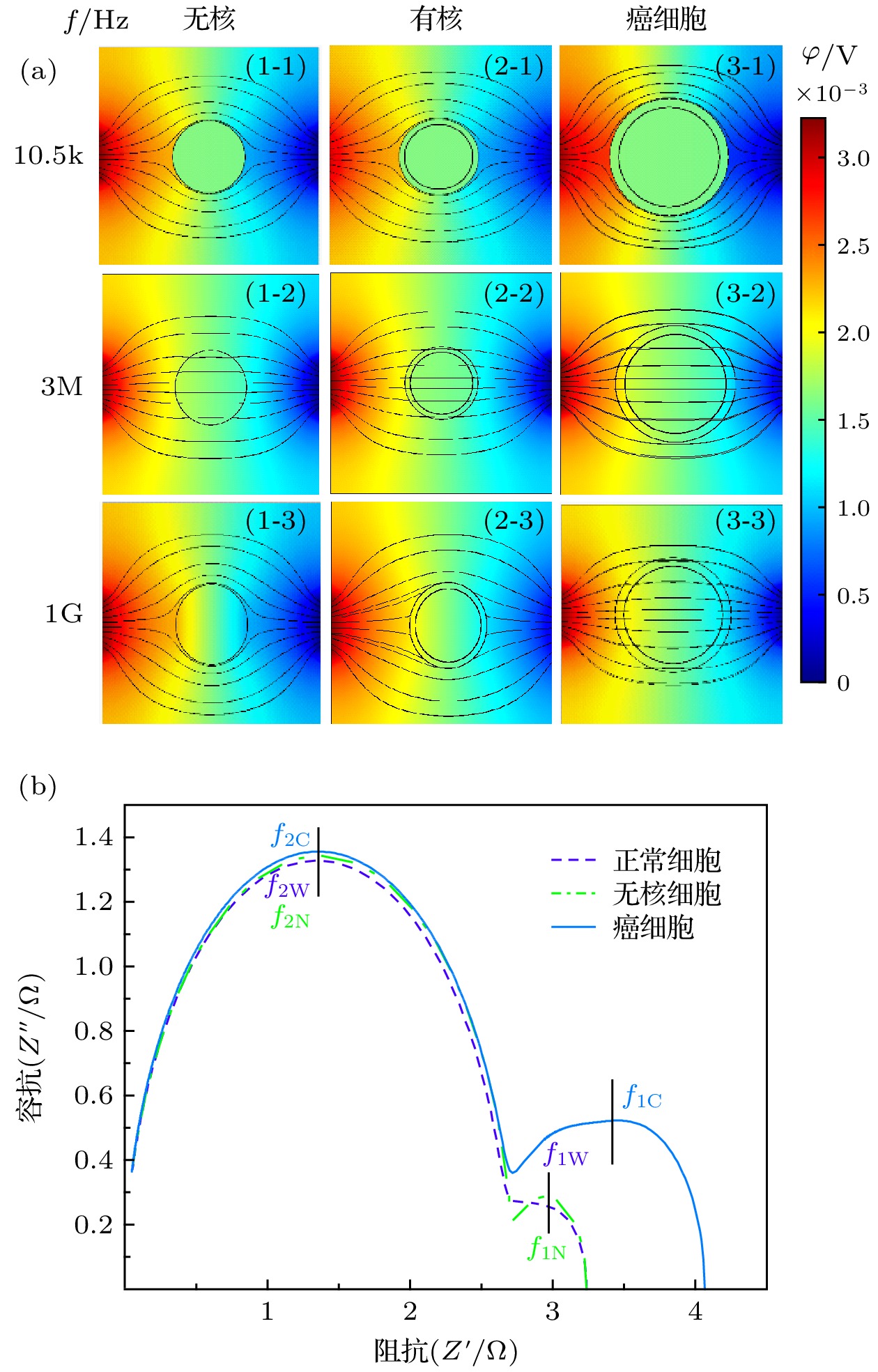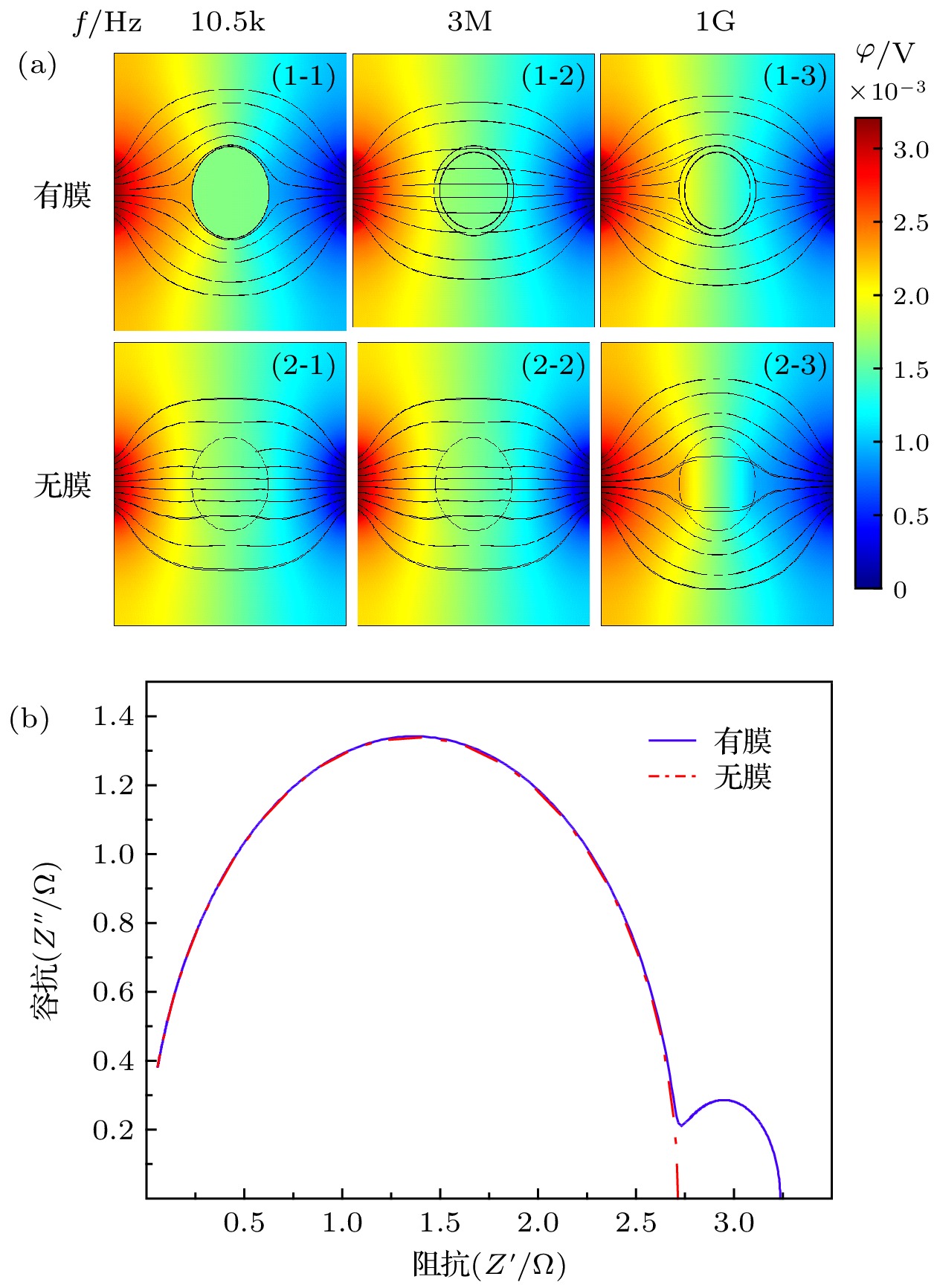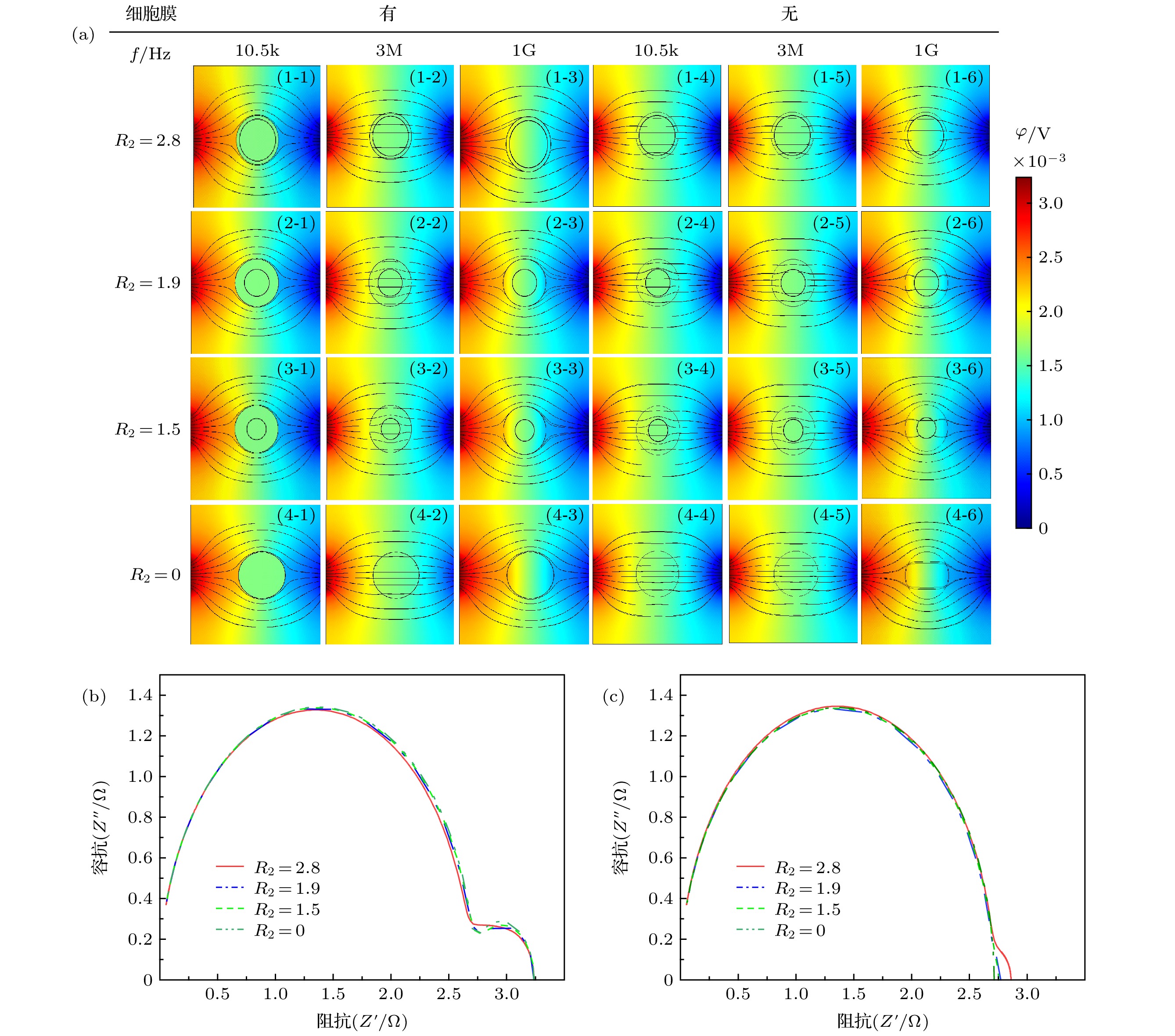-
Bioelectrical impedance spectroscopy is a noninvasive, label-free and quantitative detection technology, which has great advantages in the physiological and pathological analysis of biological cells and tissues. In this paper, the relationship between the electrical properties of a single cell and its structure is studied by numerical simulation. Moreover, experiments are conducted to verify the simulation results. For simulation, three single cell models are used to express its structure. Among of the three models, No Shell Model (NS) is proposed in this paper to study the influence of cell membrane on bioelectrical impedance spectroscopy. In addition, the effects of cell type, cell membrane and cell nucleus on its electrical properties are studied by simulation based on Single Shell Model (SS) and Two Shell Model (TS). The simulation results show that: 1) the electrical characteristics of cells can reflect its structure, therefore, the cell type can be accurately distinguished by its electrical characteristics; 2) the high frequency part of the Cole-Cole Plot is caused by ionic polarization of cytoplasm or extracellular fluid, and the low frequency part of the Cole-Cole Plot is caused by interface polarization between cell membrane and the extracellular fluid; 3) the influence of cell nucleus size on impedance measurement is mainly in the low frequency range, which is caused by the polarization of the interface between cell nucleus and intracellular fluid, and when the nucleocytoplasmic ratio is less than 0.25, the effect of nuclear size on impedance analysis could be ignored. Finally, an experiment was conducted on 20% yeasts suspension with different activity to verify the simulation results. It is known that the cell membranes of dead yeasts are destroyed, however, living yeasts have completed cell structures. The structure difference between living and dead yeast is distinguished by electrical impedance spectroscopy through numerical simulation. The experimental results are consistent with the simulation results, which verifies the fact that the high frequency part of the Cole-Cole Plot is caused by ionic polarization of cytoplasm or extracellular fluid, and the low frequency part of the Cole-Cole Plot is caused by interface polarization between cell membrane and the extracellular fluid.
-
Keywords:
- electrical impedance spectroscopy /
- cell model /
- numerical simulation /
- electrical characteristics
[1] Pierga J Y, Bonneton C, Vincent-Salomon A, Cremoux P D, Magdelénat H 2004 Clin. Cancer Res. 10 1392
 Google Scholar
Google Scholar
[2] Haba R, Miki H, Kobayashi S, Ohmori M 1993 Cancer 72 3258
 Google Scholar
Google Scholar
[3] Kern D H, Drogemuller C R, Kennedy M C, Hildebrand-Zanki S U, Sondak V K 1985 Cancer Res. 45 5436
[4] Bera T K, Nagaraju J, Lubineau G 2016 J. Visualization 19 691
 Google Scholar
Google Scholar
[5] 郭各朴, 宿慧丹, 丁鹤平, 马青玉 2017 66 164301
 Google Scholar
Google Scholar
Guo G P, Su H D, Ding H P, Ma Q Y 2017 Acta Phys. Sin. 66 164301
 Google Scholar
Google Scholar
[6] Xu Y, Xie X, Duan Y, Wang L, Cheng Z, Cheng J 2016 Biosens. Bioelectron. 77 824
 Google Scholar
Google Scholar
[7] Heileman K, Daoud J, Tabrizian M 2013 Biosens. Bioelectron. 49 348
 Google Scholar
Google Scholar
[8] Hodgkin A L, Huxley A F 1989 Bull. Math. Biol. 52 25
[9] Kanai H, Sakamoto K, Haeno M 1983 J. Microwave Power 18 233
 Google Scholar
Google Scholar
[10] 方云, 汤治元, 张倩, 赵鑫, 马青 2014 生物医学工程学杂志 5 1070
 Google Scholar
Google Scholar
Fang Y, Tang Z Y, Zhang Q, Zhao X, Ma Q 2014 J. Biomed. Eng. 5 1070
 Google Scholar
Google Scholar
[11] 王威, 董秀珍, 付峰, 刘蒙, 杨鹏飞, 史学涛, 刘锐岗 2010 医疗卫生装备 31 20
 Google Scholar
Google Scholar
Wang W, Dong X Z, Fu F, Liu M, Yang P F, Shi X T 2010 Chin. Med. Equip. J. 31 20
 Google Scholar
Google Scholar
[12] Amin N, Rayhan S, Anik A A, Jameel R 2016 Proceeding of the Second International Conference on Research in Computational Intelligence and Communication Networks Kolkata, India, September 23–25, 2016 p147
[13] Sun T, Bernabini C, Morgan H 2010 Langmuir 26 3821
 Google Scholar
Google Scholar
[14] Guo X, Zhu R, Zong X 2015 Analyst 140 156
 Google Scholar
Google Scholar
[15] Zhu Z, Xu X, Lei F, Pan D, Huang Q A 2016 Sens. Actuators, 235 515
 Google Scholar
Google Scholar
[16] Asami K, Takahashi Y, Takashima S 1989 Biochim. Biophys. Acta 1010 49
 Google Scholar
Google Scholar
[17] Irimajiri A, Doida Y, Hanai T, Inouye A 1978 J. Membr. Biol. 38 209
 Google Scholar
Google Scholar
[18] Hanai T, Asami K, Koizumi N 2005 Phys. Rev. Lett. 57 297
[19] Joshi R P, Hu Q, Schoenbach K H 2004 IEEE Trans. Plasma Sci. 32 1677
 Google Scholar
Google Scholar
[20] Woolley A T, Hadley D, Landre P, de Mello A J, Mathies R A, Northrup M A 1996 Anal. Chem. 68 4081
 Google Scholar
Google Scholar
[21] 姚佳烽, 姜祝鹏, 赵桐, 王昊, 陈柏, 吴洪涛 2019 分析化学 47 62
Yao J F, Jiang Z P, Zhao T, Wang H, Chen B, Wu H T 2019 Anal. Chem. 47 62
[22] Asami K 2002 J. Non-Cryst. Solids 305 0
-
表 1 正常B细胞及病变B细胞的仿真参数
Table 1. Simulation parameters of normal and malignant (farage) onsillar B-cells[19].
参数 正常细胞 癌细胞 导电率σ/S·m–1 环境 0.6 0.6 细胞膜 5.6 × 10–5 9.1 × 10–6 细胞质 1.31 0.48 核膜 1.11 × 10–2 4.4 × 10–3 核质 2.04 1.07 相对介电常数 环境 80 80 细胞膜 12.8 9.8 细胞质 60 60 核膜 106 60.3 核质 120 120 几何参数/μm 仿真区域(L × L) 20 × 20 20 × 20 电极$ (l) $ 2 × 4 2 × 4 细胞半径(R1) 3.3 5.2 细胞核半径(R2) 2.8 4.4 细胞膜厚(d1) 0.007 0.007 核膜厚(d2) 0.04 0.04 -
[1] Pierga J Y, Bonneton C, Vincent-Salomon A, Cremoux P D, Magdelénat H 2004 Clin. Cancer Res. 10 1392
 Google Scholar
Google Scholar
[2] Haba R, Miki H, Kobayashi S, Ohmori M 1993 Cancer 72 3258
 Google Scholar
Google Scholar
[3] Kern D H, Drogemuller C R, Kennedy M C, Hildebrand-Zanki S U, Sondak V K 1985 Cancer Res. 45 5436
[4] Bera T K, Nagaraju J, Lubineau G 2016 J. Visualization 19 691
 Google Scholar
Google Scholar
[5] 郭各朴, 宿慧丹, 丁鹤平, 马青玉 2017 66 164301
 Google Scholar
Google Scholar
Guo G P, Su H D, Ding H P, Ma Q Y 2017 Acta Phys. Sin. 66 164301
 Google Scholar
Google Scholar
[6] Xu Y, Xie X, Duan Y, Wang L, Cheng Z, Cheng J 2016 Biosens. Bioelectron. 77 824
 Google Scholar
Google Scholar
[7] Heileman K, Daoud J, Tabrizian M 2013 Biosens. Bioelectron. 49 348
 Google Scholar
Google Scholar
[8] Hodgkin A L, Huxley A F 1989 Bull. Math. Biol. 52 25
[9] Kanai H, Sakamoto K, Haeno M 1983 J. Microwave Power 18 233
 Google Scholar
Google Scholar
[10] 方云, 汤治元, 张倩, 赵鑫, 马青 2014 生物医学工程学杂志 5 1070
 Google Scholar
Google Scholar
Fang Y, Tang Z Y, Zhang Q, Zhao X, Ma Q 2014 J. Biomed. Eng. 5 1070
 Google Scholar
Google Scholar
[11] 王威, 董秀珍, 付峰, 刘蒙, 杨鹏飞, 史学涛, 刘锐岗 2010 医疗卫生装备 31 20
 Google Scholar
Google Scholar
Wang W, Dong X Z, Fu F, Liu M, Yang P F, Shi X T 2010 Chin. Med. Equip. J. 31 20
 Google Scholar
Google Scholar
[12] Amin N, Rayhan S, Anik A A, Jameel R 2016 Proceeding of the Second International Conference on Research in Computational Intelligence and Communication Networks Kolkata, India, September 23–25, 2016 p147
[13] Sun T, Bernabini C, Morgan H 2010 Langmuir 26 3821
 Google Scholar
Google Scholar
[14] Guo X, Zhu R, Zong X 2015 Analyst 140 156
 Google Scholar
Google Scholar
[15] Zhu Z, Xu X, Lei F, Pan D, Huang Q A 2016 Sens. Actuators, 235 515
 Google Scholar
Google Scholar
[16] Asami K, Takahashi Y, Takashima S 1989 Biochim. Biophys. Acta 1010 49
 Google Scholar
Google Scholar
[17] Irimajiri A, Doida Y, Hanai T, Inouye A 1978 J. Membr. Biol. 38 209
 Google Scholar
Google Scholar
[18] Hanai T, Asami K, Koizumi N 2005 Phys. Rev. Lett. 57 297
[19] Joshi R P, Hu Q, Schoenbach K H 2004 IEEE Trans. Plasma Sci. 32 1677
 Google Scholar
Google Scholar
[20] Woolley A T, Hadley D, Landre P, de Mello A J, Mathies R A, Northrup M A 1996 Anal. Chem. 68 4081
 Google Scholar
Google Scholar
[21] 姚佳烽, 姜祝鹏, 赵桐, 王昊, 陈柏, 吴洪涛 2019 分析化学 47 62
Yao J F, Jiang Z P, Zhao T, Wang H, Chen B, Wu H T 2019 Anal. Chem. 47 62
[22] Asami K 2002 J. Non-Cryst. Solids 305 0
Catalog
Metrics
- Abstract views: 17279
- PDF Downloads: 355
- Cited By: 0















 DownLoad:
DownLoad:





